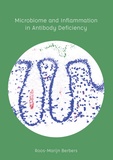Microbiome and Inflammation in Antibody Deficiency
Summary
Common variable immunodeficiency (CVID) is an immune deficiency that not only causes increased susceptibility to infection, but also to inflammatory complications such as autoimmunity, lymphoid proliferation, cancer and granulomatous disease. Recent findings implicate the microbiome as a driver of this systemic immune dysregulation. We investigated the role of gut and respiratory microbiota in inflammation and immune dysregulation in CVID. In this thesis we show that immune dysregulation in patients with CVID is a complex and heterogeneous disease that comprises profound chronic activation of the immune system. While previous research has already demonstrated that Immunoglobulin A (IgA), which is deficient in many CVID patients, plays a key role in homeostasis of the microbiome, we showed in a cross-sectional study in patients with stable CVID that chronic lung disease was associated with IgA deficiency and an abundance of specific oropharyngeal bacterial taxa (as compared to healthy controls). We additionally found further support for the hypothesis that a dysregulated gut microbiota contributes to systemic inflammation in CVID. In addition, we identified Enterococcus gallinarum as a pathogen of interest in CVID with immune dysregulation We conclude that in CVID, immune deficiency can result in microbial dysbiosis, including presence of specific pathogens that are associated with autoimmune disease, which exacerbates the deregulation and chronic activation of the immune system resulting in clinical disease.
